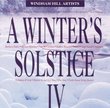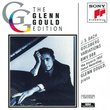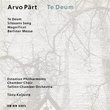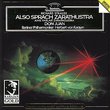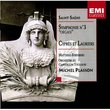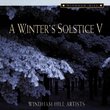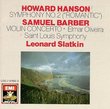| All Artists: Ralph Vaughan Williams, Adrian Boult, London Philharmonic Orchestra, New Philharmonia Orchestra, Margaret Price Title: Ralph Vaughan Williams: Symphonies Nos. 3 & 5 Members Wishing: 0 Total Copies: 0 Label: EMI Classics Release Date: 9/12/1991 Genre: Classical Styles: Historical Periods, Modern, 20th, & 21st Century, Symphonies Number of Discs: 1 SwapaCD Credits: 1 UPCs: 077776401829, 077776401850 |
Search - Ralph Vaughan Williams, Adrian Boult, London Philharmonic Orchestra :: Ralph Vaughan Williams: Symphonies Nos. 3 & 5
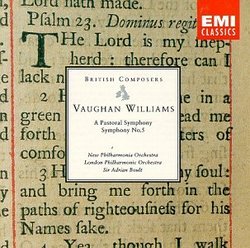 | Ralph Vaughan Williams, Adrian Boult, London Philharmonic Orchestra Ralph Vaughan Williams: Symphonies Nos. 3 & 5 Genre: Classical
These are two of Vaughan Williams's greatest symphonies. (Some think his Fifth is his best.) The Third Symphony (1922), subtitled "The Pastoral Symphony," brings to mind the lush imagery of the English countryside and is f... more » |
Larger Image |
CD DetailsSynopsis
Amazon.com These are two of Vaughan Williams's greatest symphonies. (Some think his Fifth is his best.) The Third Symphony (1922), subtitled "The Pastoral Symphony," brings to mind the lush imagery of the English countryside and is filled with heartbreaking melodies. (It was written in part while the composer was in the service in WWI.) His Fifth Symphony (1943) is an outgrowth of the music from his great opera, The Pilgrim's Progress, eventually published in 1951. In part, the symphony is a return to his warmer style, a turn away from the acerbic Fourth Symphony, which the public hated. And, yes, it probably is his greatest symphony. --Paul Cook Similarly Requested CDs
|
CD ReviewsTRANSCENDENTAL VAUGHAN WILLIAMS Melvyn M. Sobel | Freeport (Long Island), New York | 07/18/2001 (5 out of 5 stars) "I remember my first encounter with Vaughan Williams; it was, of course, his Symphony No. 2 ("London")--- and doesn't it always seem to be THIS particular symphony, especially when you're young, like I was, and open to music you may never have heard. Naturally, I thought it was grand, and it is. As is his Symphony No. 7 ("Sinfonia Antartica"), which I discovered soon afterwards and also felt thrilled by. As a novice, I fell easily under the accessibility of these works--- and the spells they cast. I would never give up this period of some thirty years ago, or the hunger that drove me to search out more and more music, or the growth that it incurred. However, time and age intervene, as they are apt to do, and our vision widens, our experience broadens, life, with its diverse pleasure and pain, enables us or forces us to open ourselves even further. Thus I came to VW's Symphonies No.'s 3 and 5, not because I had never heard them or owned them. To the contrary, I collected three complete sets of the VW Symphonies, in my LP days, the Boult included; but I never REALLY heard them. And these two symphonies in particular never really "touched" me... barely even listened to them... until now, years and years later. Now they float over my soul like the dusk of a late autumn afternoon--- when my heart is filled with the wonder and puzzlement of seasons, years, decades gone by--- and the spirit, too, admits that the evening shadows are indeed growing longer and suddenly the sense of things past becomes an intense, yearning nostalgia. [I wish that in my twenties I had had, emotionally, what I do now in my early fifties--- and the wisdom to go hand-in-hand with it! But those regrets are better left for another time.] With the ageless Sir Adrian at the podium, Vaughan Williams' Symphonies 3 and 5 are as beautiful, and bountiful, a coupling as one could wish for--- and in peerless performances like these, they bring tears to the eyes. From the haunting opening bars of the "Pastoral," so reminiscent of "The Lark Ascending," we are enveloped by such a languid melancholy, lulled pervasively into such a womb-like and secure "place," that the temptation to stay "in the moment" is more than simply an overpowering desire: it is a need that arises from the innermost part of us. Boult's flowing sense of orchestral color, nuance and detail, his hushed and ethereal handling of VW's mournfully heartfelt passages, his complete and utter sympathy with composition and composer--- all --- make this "Pastoral" something that beggars description. And the Fifth Symphony? This is, absolutely, VW's greatest achievement and, at that point in his life, the synthesis of everything he was--- and the promise of everything he would, as we know, become. What an ebb and flow exist in this work! What glorious swells of lyricism and emotion wash over us; what an all-surrounding atmosphere encompasses! Like a spiritual "sister" to the "Pastoral," listening to the Fifth Symphony is like drinking from the wellspring of life--- and becoming as one renewed, reborn --- a powerfil simile for one of the symphonic milestones of the twentieth century. EMI has joined together VW's most wonderous of symphonies and, under the baton of Sir Adrian (with grand sound from both the New Philharmonia and London Philharmonic), has secured a definitive place in the VW catalogue for both on this most magnificent of CDs. [Running time: 71:28]" VAUGHAN WILLIAMS's great symphonies conducted by Boult 11/10/1999 (5 out of 5 stars) "This is a package of two of the most significative symphonies by Ralph Vaughan Williams. The EMI/Boult series of VW' works usually meant definitive performance. This disc sparkles with beautiful orchestral sound, and Boult's attention to detail (he, for one, was one of the first associated conductors with the works of VW). The performances we find on this CD are of excellent musical quality, and the orchestras involved have well displayed the magnificence of these symphonic masterpieces. Boult is generally a synonym for great VW - his rendition of the 5th in D (with the LPO) offers one of the absolute on record. The atmospheric, glowing string sound, the subtle variations in orchestral volume and balance, and the integrity of the musical structures, are strenghts of the present recording (this wasn't the first time Boult made it on record). One of my favorites, this VW recording is one to be treasured; since the "Pastoral" Symphony is a pertinent match with the No.5, the album is pleasant to listen to from debut to the end. It certainly recalls the fascinating beauty of these romantic works, and is a contribution that belongs to the utmost musical achievements the 20th century has to offer." Powerful and serene V W Melvyn M. Sobel | 09/24/2002 (5 out of 5 stars) "These are two qualities melted one into another that outline symphony 3 "Pastoral" and 5. The scope is musically generous, rich, while maintaining the substance of everything this composer did. The conducting , as does the playing, is matched or surpassed only by a few peers. Two great pieces with solemn melodies, with dark/light stamina, a disquietude longing for pastoral respite."
|

 Track Listings (8) - Disc #1
Track Listings (8) - Disc #1